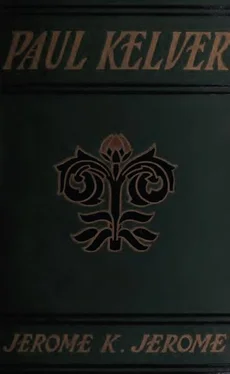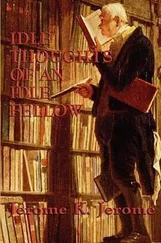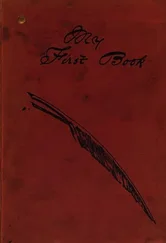Jerome Jerome - Paul Kelver
Здесь есть возможность читать онлайн «Jerome Jerome - Paul Kelver» весь текст электронной книги совершенно бесплатно (целиком полную версию без сокращений). В некоторых случаях можно слушать аудио, скачать через торрент в формате fb2 и присутствует краткое содержание. Город: New York, Год выпуска: 1902, Издательство: Dodd, Mead & Company, Жанр: Классическая проза, на английском языке. Описание произведения, (предисловие) а так же отзывы посетителей доступны на портале библиотеки ЛибКат.
- Название:Paul Kelver
- Автор:
- Издательство:Dodd, Mead & Company
- Жанр:
- Год:1902
- Город:New York
- ISBN:нет данных
- Рейтинг книги:3 / 5. Голосов: 1
-
Избранное:Добавить в избранное
- Отзывы:
-
Ваша оценка:
- 60
- 1
- 2
- 3
- 4
- 5
Paul Kelver: краткое содержание, описание и аннотация
Предлагаем к чтению аннотацию, описание, краткое содержание или предисловие (зависит от того, что написал сам автор книги «Paul Kelver»). Если вы не нашли необходимую информацию о книге — напишите в комментариях, мы постараемся отыскать её.
Paul Kelver — читать онлайн бесплатно полную книгу (весь текст) целиком
Ниже представлен текст книги, разбитый по страницам. Система сохранения места последней прочитанной страницы, позволяет с удобством читать онлайн бесплатно книгу «Paul Kelver», без необходимости каждый раз заново искать на чём Вы остановились. Поставьте закладку, и сможете в любой момент перейти на страницу, на которой закончили чтение.
Интервал:
Закладка:
Jerome K. Jerome
Paul Kelver
Prologue.
In which the author seeks to cast the responsibility of this story upon another.
At the corner of a long, straight, brick-built street in the far East End of London—one of those lifeless streets, made of two drab walls upon which the level lines, formed by the precisely even window-sills and doorsteps, stretch in weary perspective from end to end, suggesting petrified diagrams proving dead problems—stands a house that ever draws me to it; so that often, when least conscious of my footsteps, I awake to find myself hurrying through noisy, crowded thoroughfares, where flaring naphtha lamps illumine fierce, patient, leaden-coloured faces; through dim-lit, empty streets, where monstrous shadows come and go upon the close-drawn blinds; through narrow, noisome streets, where the gutters swarm with children, and each ever-open doorway vomits riot; past reeking corners, and across waste places, till at last I reach the dreary goal of my memory-driven desire, and, coming to a halt beside the broken railings, find rest.
The house, larger than its fellows, built when the street was still a country lane, edging the marshes, strikes a strange note of individuality amid the surrounding harmony of hideousness. It is encompassed on two sides by what was once a garden, though now but a barren patch of stones and dust where clothes—it is odd any one should have thought of washing—hang in perpetuity; while about the door continue the remnants of a porch, which the stucco falling has left exposed in all its naked insincerity.
Occasionally I drift hitherward in the day time, when slatternly women gossip round the area gates, and the silence is broken by the hoarse, wailing cry of “Coals—any coals—three and sixpence a sack—co-o-o-als!” chanted in a tone that absence of response has stamped with chronic melancholy; but then the street knows me not, and my old friend of the corner, ashamed of its shabbiness in the unpitying sunlight, turns its face away, and will not see me as I pass.
Not until the Night, merciful alone of all things to the ugly, draws her veil across its sordid features will it, as some fond old nurse, sought out in after years, open wide its arms to welcome me. Then the teeming life it now shelters, hushed for a time within its walls, the flickering flare from the “King of Prussia” opposite extinguished, will it talk with me of the past, asking me many questions, reminding me of many things I had forgotten. Then into the silent street come the well-remembered footsteps; in and out the creaking gate pass, not seeing me, the well-remembered faces; and we talk concerning them; as two cronies, turning the torn leaves of some old album where the faded portraits in forgotten fashions, speak together in low tones of those now dead or scattered, with now a smile and now a sigh, and many an “Ah me!” or “Dear, dear!”
This bent, worn man, coming towards us with quick impatient steps, which yet cease every fifty yards or so, while he pauses, leaning heavily upon his high Malacca cane: “It is a handsome face, is it not?” I ask, as I gaze upon it, shadow framed.
“Aye, handsome enough,” answers the old House; “and handsomer still it must have been before you and I knew it, before mean care had furrowed it with fretful lines.”
“I never could make out,” continues the old House, musingly, “whom you took after; for they were a handsome pair, your father and your mother, though Lord! what a couple of children!”
“Children!” I say in surprise, for my father must have been past five and thirty before the House could have known him, and my mother's face is very close to mine, in the darkness, so that I see the many grey hairs mingling with the bonny brown.
“Children,” repeats the old House, irritably, so it seems to me, not liking, perhaps, its opinions questioned, a failing common to old folk; “the most helpless pair of children I ever set eyes upon. Who but a child, I should like to know, would have conceived the notion of repairing his fortune by becoming a solicitor at thirty-eight, or, having conceived such a notion, would have selected the outskirts of Poplar as a likely centre in which to put up his door-plate?”
“It was considered to be a rising neighbourhood,” I reply, a little resentful. No son cares to hear the family wisdom criticised, even though at the bottom of his heart he may be in agreement with the critic. “All sorts and conditions of men, whose affairs were in connection with the sea would, it was thought, come to reside hereabout, so as to be near to the new docks; and had they, it is not unreasonable to suppose they would have quarrelled and disputed with one another, much to the advantage of a cute solicitor, convenient to their hand.”
“Stuff and nonsense,” retorts the old House, shortly; “why, the mere smell of the place would have been sufficient to keep a sensible man away. And”—the grim brick face before me twists itself into a goblin smile—“he, of all men in the world, as 'the cute solicitor,' giving advice to shady clients, eager to get out of trouble by the shortest way, can you fancy it! he who for two years starved himself, living on five shillings a week—that was before you came to London, when he was here alone. Even your mother knew nothing of it till years afterwards—so that no man should be a penny the poorer for having trusted his good name. Do you think the crew of chandlers and brokers, dock hustlers and freight wreckers would have found him a useful man of business, even had they come to settle here?”
I have no answer; nor does the old House wait for any, but talks on.
“And your mother! would any but a child have taken that soft-tongued wanton to her bosom, and not have seen through acting so transparent? Would any but the veriest child that never ought to have been let out into the world by itself have thought to dree her weird in such folly? Children! poor babies they were, both of them.”
“Tell me,” I say—for at such times all my stock of common sense is not sufficient to convince me that the old House is but clay. From its walls so full of voices, from its floors so thick with footsteps, surely it has learned to live; as a violin, long played on, comes to learn at last a music of its own. “Tell me, I was but a child to whom life speaks in a strange tongue, was there any truth in the story?”
“Truth!” snaps out the old House; “just truth enough to plant a lie upon; and Lord knows not much ground is needed for that weed. I saw what I saw, and I know what I know. Your mother had a good man, and your father a true wife, but it was the old story: a man's way is not a woman's way, and a woman's way is not a man's way, so there lives ever doubt between them.”
“But they came together in the end,” I say, remembering.
“Aye, in the end,” answers the House. “That is when you begin to understand, you men and women, when you come to the end.”
The grave face of a not too recently washed angel peeps shyly at me through the railings, then, as I turn my head, darts back and disappears.
“What has become of her?” I ask.
“She? Oh, she is well enough,” replies the House. “She lives close here. You must have passed the shop. You might have seen her had you looked in. She weighs fourteen stone, about; and has nine children living. She would be pleased to see you.”
“Thank you,” I say, with a laugh that is not wholly a laugh; “I do not think I will call.” But I still hear the pit-pat of her tiny feet, dying down the long street.
The faces thicken round me. A large looming, rubicund visage smiles kindly on me, bringing back into my heart the old, odd mingling of instinctive liking held in check by conscientious disapproval. I turn from it, and see a massive, clean-shaven face, with the ugliest mouth and the loveliest eyes I ever have known in a man.
Читать дальшеИнтервал:
Закладка:
Похожие книги на «Paul Kelver»
Представляем Вашему вниманию похожие книги на «Paul Kelver» списком для выбора. Мы отобрали схожую по названию и смыслу литературу в надежде предоставить читателям больше вариантов отыскать новые, интересные, ещё непрочитанные произведения.
Обсуждение, отзывы о книге «Paul Kelver» и просто собственные мнения читателей. Оставьте ваши комментарии, напишите, что Вы думаете о произведении, его смысле или главных героях. Укажите что конкретно понравилось, а что нет, и почему Вы так считаете.












